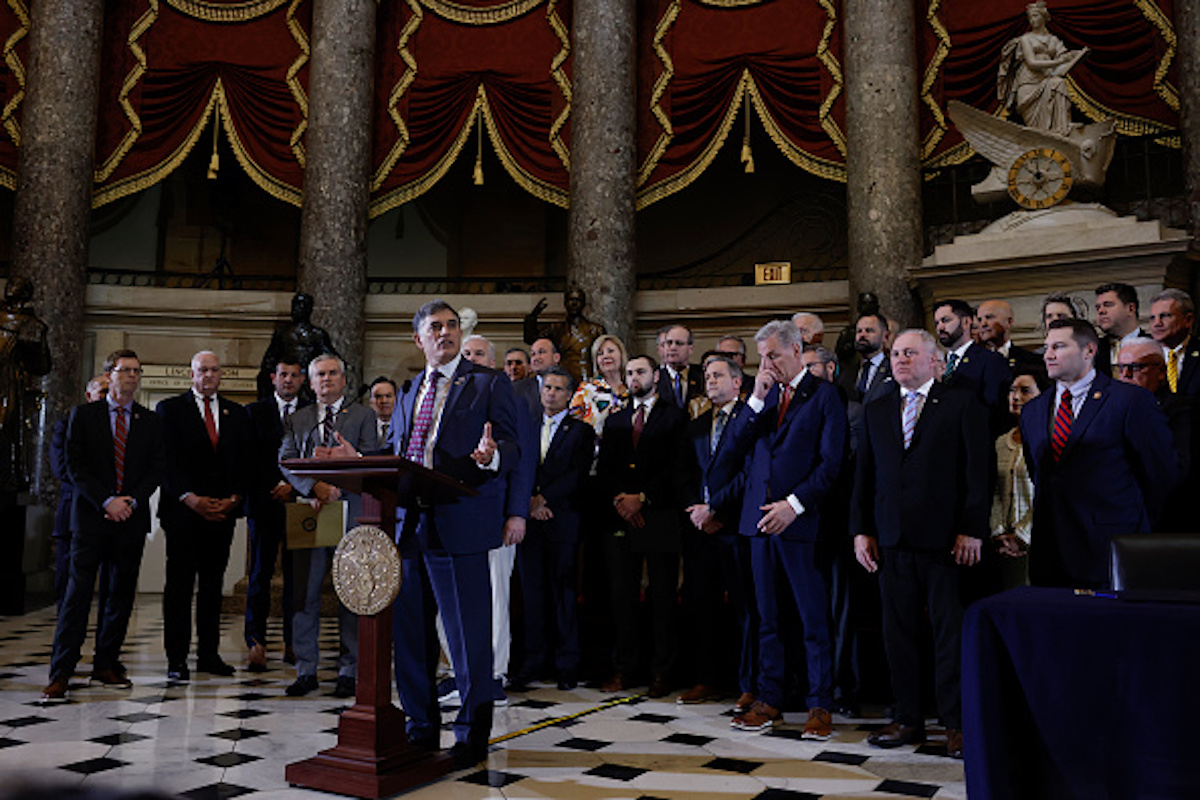The U.S. House passed legislation Wednesday to block the Washington, D.C., City Council’s Comprehensive Policing and Justice Reform Emergency Amendment Act of 2022.
The legislation was first obtained by the Daily Caller in March and focuses on the D.C. crime law, which reduces police power amid rising crime in the district. The Metropolitan Police Department (MPD) faces a historic staffing shortage and has struggled to recruit new officers.
It passed the House 229-189. Fourteen Democrats voted with Republicans in passing the legislation.
Congress can exercise authority over D.C. local affairs, according to the District Clause of the Constitution (Article 1, Section 8, Clause 17), and Congress reviews all D.C. legislation before it can become law. Congress can change or even overturn D.C. legislation and can impose new laws on the district.
Since Jan. 2020, the MPD has lost more than 1,100 officers and is currently operating in an officer deficit.
“The House has now taken another pivotal step in the fight to restore law and order in our nation’s capital city. Congress has both the authority and the responsibility to prevent the D.C. Council’s anti-police law from remaining in place, as this misguided bill severely hinders the Metropolitan Police Department’s ongoing effort to recruit and retain officers — exacerbating an already alarming problem as the police force has dwindled to a staggering half-century low under these disparaging policies,” Republican Rep. Andrew Clyde of Georgia told the Caller after the legislation passed.
“The Council’s legislation also significantly limits MPD officers from effectively doing their jobs, jeopardizing Americans’ safety in our crime-ridden capital. I thank my colleagues for passing my life-saving, pro-police resolution with bipartisan support, and I now call on both the Senate and the White House to put people over politics by joining our effort to improve public safety in our nation’s capital city.” (RELATED: EXCLUSIVE: Reps. Clyde, Garbarino Introduce Joint Resolution To Block DC’s Anti-Cop Law, Endorsed By DC Police Union)
The Comprehensive Policing and Justice Reform Emergency Amendment Act of 2022 would:
- Prohibit the Review of BWC Recordings by Investigating Officers
- Require the Immediate Release of Body-Worn Camera Footage and Names of Officers in Serious Use of Force Matters
- Remove All Police Officers from the Office of Police Complaints Board and the Union Representatives from the Use of Force Review Board
- Remove a rank-and-file police representative from the Use of Force Review Board and expands the voting members to include anti-police activists
- Allows for the Disclosure of Disciplinary Records and Creates a Public Discipline Database
- Eliminates Collective Bargaining Rights of Police Officers
- Eliminates the Requirement of Bringing Timely Discipline Against D.C. Police Officers
- Repeals D.C. Code 5-1031, which requires the MPD to commence discipline against D.C. police officers within 90 business days, which will result in abusively long disciplinary investigations that violate the Constitutional rights of D.C. police officers

Rep. Andrew Clyde (R-GA) speaks at a bill signing ceremony for H.J. Res. 26 at the U.S. Capitol Building on March 10, 2023 in Washington, DC. Once it gets to U.S. President Joe Biden’s desk, the bill will block the enactment of the D.C. City Council’s “Revised Criminal Code Act of 2022,” which congressional Republicans and some Democrats said was soft on crime. (Photo by Anna Moneymaker/Getty Images)
“This battle is far from over, as the District’s officials continue to fail both residents and visitors on a daily basis. I remain committed to returning our nation’s capital city back to the American people and restoring Congress’ full exclusive legislative authority over Washington, as our wise Founders intended in Article 1, Section 8, Clause 17 of the Constitution,” Clyde added.
The U.S. Senate passed a resolution of disapproval to block the Washington, D.C., City Council’s Revised Criminal Code Act of 2022, which would lower penalties for a number of violent criminal offenses. The Caller first broke the news of the legislation on Feb. 2. The vote was 81-14, with a total of 33 Democrats voting with Republicans to pass the bill. (RELATED: EXCLUSIVE: House, Senate GOP To Start ‘DC Home Rule’ Vote To Block District’s New Crime Law)
The D.C. Council approved the Revised Criminal Code Act (RCCA) in Nov. 2022. The RCCA reduces penalties for certain violent criminal offenses, including carjackings, robberies and homicides. Democratic D.C. Mayor Muriel Bowser vetoed the bill on Jan. 4, but the council overrode her veto Jan. 17 by a vote of 12-1.
The legislation picked up support from the D.C. Police Union, who said the act’s proposals are dangerous and would lead to more crime in the nation’s capital.
“The introduction of this new House Joint Resolution is necessary to protect public safety in our Nation’s Capital,” D.C. Police Union Chairman Gregg Pemberton said. “This Act is a dangerous law that destroys collective bargaining rights of MPD police officers, eviscerates due process, reduces less-lethal options for law enforcement during a riot, and further contributes to the critical staffing crisis that is plaguing the Metropolitan Police Department (MPD) today. This Act is laced with bad policies with real-world consequences that delay justice for families and victims.”


